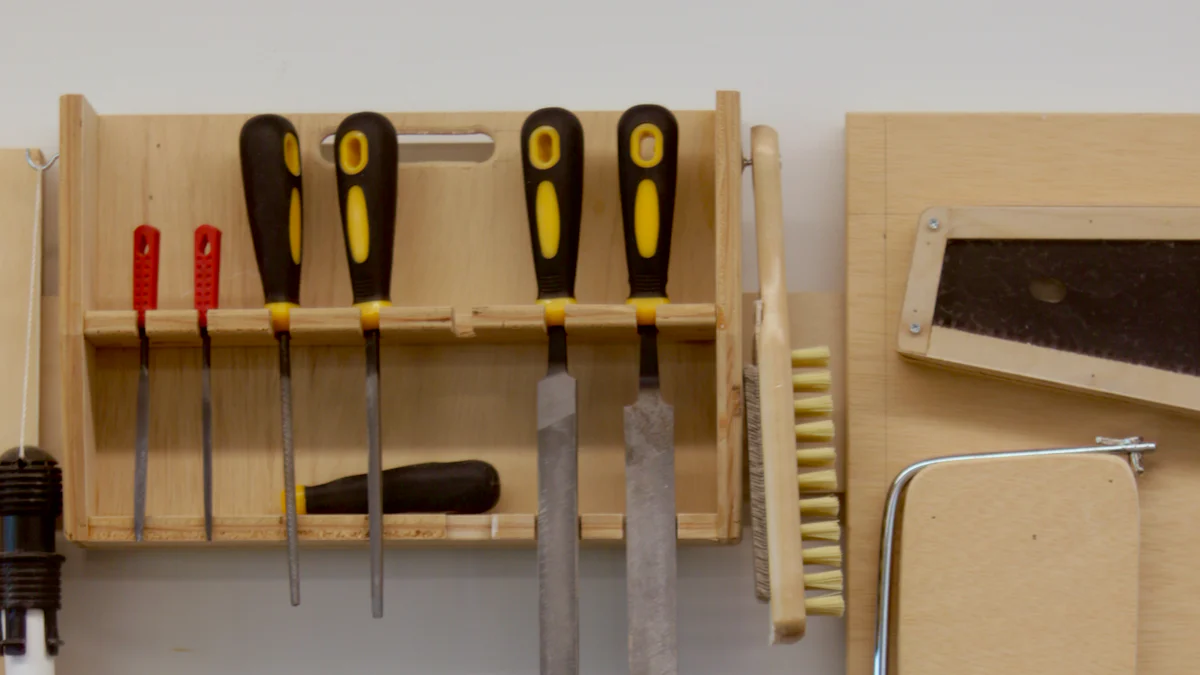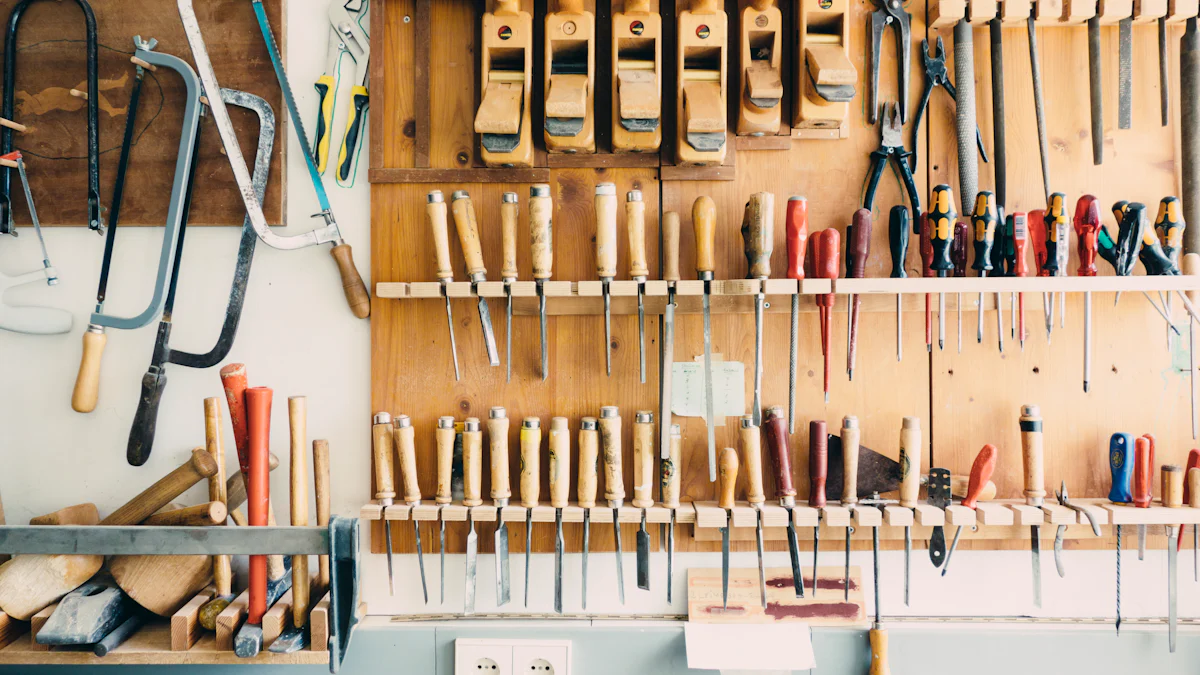
Having the right tools for woodworking is crucial. Quality tools can make woodworking easier and more enjoyable. Beginners should invest in high-quality woodworking hand tools for beginners to ensure a smooth learning experience. Proper tools enhance accuracy, efficiency, and safety in every project. Investing in durable and efficient tools will lead to better results and a more satisfying woodworking journey.
Essential Woodworking Hand Tools for Beginners

Cutting Tools
Hand Saw
A hand saw is a fundamental tool for any beginner. It allows for precise cuts in wood. Beginners should invest in high-quality handsaws to avoid frustrations caused by cheap or dull blades. A good hand saw can make rip cuts and cross cuts with ease. Having a reliable hand saw ensures clean and accurate cuts in various woodworking projects.
Chisels
Chisels are versatile tools essential for joinery and refining shapes. Beginners should start with 1/4, 3/8, and 1-inch chisels. Vintage chisels often provide excellent quality at a lower cost. Setting up a chisel is a simple process and a crucial skill to learn. Chisels can pare to final shape and refine the fit of tenons or half laps. These tools are indispensable for detailed woodworking tasks.
Coping Saw
A coping saw is necessary for making intricate cuts and shapes. This tool is perfect for cutting curves and detailed patterns. Beginners will find the coping saw useful for creating decorative elements in their projects. A good coping saw enhances creativity and precision in woodworking.
Measuring and Marking Tools
Tape Measure
A tape measure is an essential tool for ensuring accurate measurements. Precision is critical in woodworking. A reliable tape measure helps achieve exact dimensions. This tool is indispensable for planning and executing projects accurately.
Combination Square
A combination square is a versatile marking tool. It ensures accurate measurements and angles. Beginners should invest in a high-quality combination square. This tool helps achieve precise right angles and straight lines. Accurate marking is crucial for successful woodworking projects.
Marking Gauge
A marking gauge is used to scribe lines parallel to the edge of a workpiece. This tool ensures consistent and accurate markings. Beginners will find the marking gauge useful for tasks like mortising and tenon joints. Precise marking leads to better fitting joints and cleaner results.
Shaping and Smoothing Tools
Block Plane
A block plane is essential for smoothing and shaping wood surfaces. Investing in a block plane is crucial for beginners. This tool helps achieve a smooth finish and precise shaping. A good block plane enhances the quality of woodworking projects.
Spokeshave
A spokeshave is used for shaping and smoothing curved surfaces. This tool is perfect for creating rounded edges and intricate shapes. Beginners will find the spokeshave useful for detailed work. A reliable spokeshave adds versatility to a woodworking toolkit.
Sanding Block
A sanding block is necessary for finishing wood surfaces. This tool ensures a smooth and even finish. Beginners should use a sanding block to remove rough spots and imperfections. A good sanding block enhances the final appearance of woodworking projects.
Assembly Tools
Clamps
Clamps are vital for holding pieces of wood together while glue dries or during assembly. Beginners should start with a variety of clamps, such as bar clamps and C-clamps. These tools ensure that joints stay tight and aligned. Using clamps prevents movement, leading to more precise and sturdy constructions.
Mallet
A mallet is essential for striking chisels without damaging their handles. Beginners should choose a wooden or rubber mallet. This tool provides controlled force, making it ideal for delicate tasks. A mallet helps in assembling joints by gently tapping pieces into place without causing damage.
Screwdrivers
Screwdrivers are necessary for driving screws into wood. Beginners should have both flathead and Phillips head screwdrivers. These tools come in various sizes to fit different screw heads. Using the right screwdriver ensures secure and tight fastenings in woodworking projects.
Safety Tools
Safety Glasses
Safety glasses protect eyes from dust, wood chips, and other debris. Beginners must wear safety glasses during all woodworking activities. These tools prevent eye injuries, ensuring a safe working environment. Clear vision is crucial for precision and accuracy in woodworking.
Ear Protection
Ear protection guards against hearing damage from loud tools and machinery. Beginners should use earplugs or earmuffs. These tools reduce noise levels, making the workshop safer and more comfortable. Protecting hearing is essential for long-term health and safety.
Dust Mask
A dust mask protects lungs from inhaling sawdust and other particles. Beginners should wear a dust mask when sanding, cutting, or working with wood. These tools prevent respiratory issues, ensuring a healthier work environment. Clean air is vital for maintaining overall well-being during woodworking projects.
Having the right tools is essential for success in woodworking. Quality tools enhance accuracy, efficiency, and safety. Beginners should start building their tool collection with essential woodworking hand tools for beginners. Investing in durable and efficient tools will lead to better results. Beginners should focus on mastering each tool to improve skills. Start with a solid wooden workbench as a foundational tool. Practice regularly to gain confidence and proficiency. Enjoy the journey of creating beautiful and functional wooden projects.
See Also
Supreme Handbook for Warm Winter with Cozy Sock Accessories
Cruising Gear: Best Quality Components for Motor Scooters
Discovering the Range of Sock Options for Males and Females
